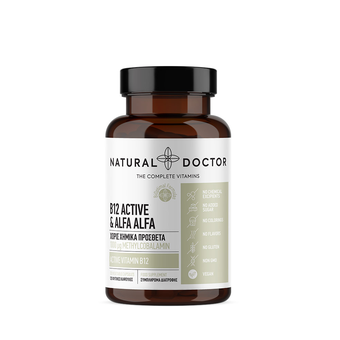B12 Bliss: Fueling Your Body and Mind

Vitamin B12 is found naturally in animal food or supplements. Vitamin B12 is vital for the formation of red blood cells and DNA. It is also a critical factor in the function and development of nerve cells and the brain.
Vitamin B12 binds to the protein in the foods we eat. Hydrochloric acid and enzymes release vitamin B12 into its free form in the stomach.
Then, vitamin B12 combines with a protein called endogenous factor to be absorbed later in the small intestine. Supplements that contain B12 in its free form can be absorbed more easily by the body.
There are a variety of vitamin B12 supplements available. Although there are claims that sublingual tablets or liquids placed under the tongue are better absorbed than traditional tablets, studies have not shown a significant difference.
In severe vitamin B12 deficiency due to insufficient inherent factors, such as pernicious anemia, doctors usually prescribe B12 injections into the muscles.
Food Sources of vitamin B12
- Fish, shellfish
- Liver
- Red meat
- Eggs
- Poultry
- Dairy products such as milk, cheese and yogurt
- Fortified nutritional yeast
- Fortified breakfast cereals
- Enriched soy or rice milk
Signs of deficiency and toxicity
Measuring vitamin B12 in the blood is not the best way to determine if someone is deficient, as some deficient people may have normal blood levels of B12.
Blood methylmalonic acid and homocysteine levels are better indicators of vitamin B12. These values increase when there is vitamin B12 deficiency. It is estimated that almost 15% of the population is vitamin B12 deficient.
Deficiency in vegans and vegetarians
Vitamin B12 deficiency is often observed in vegetarians who do not consume meat, fish, poultry, or dairy products, as vitamin B12 is naturally found only in animal products.
Studies have shown that vegetarians have low blood levels of vitamin B12, so those following a vegetarian or vegan diet should include B12-fortified foods or supplements in their diet.
It is crucial for pregnant women, as the fetus needs adequate levels of vitamin B12 for neurological development, and deficiency can lead to permanent neurological damage.
Medicines for stomach acid
A common cause of B12 deficiency, especially in older people, is the lack of stomach acid since stomach acid is necessary to release vitamin B12 from food.
Approximately 10-30% of adults over 50 have difficulty absorbing vitamin B12 from food.
People who routinely consume medications to suppress stomach acids may have difficulty absorbing vitamin B12 from food. Anyone who uses these drugs for a long time is at risk of vitamin B12 deficiency.
Crohn's disease
Certain diseases, including Crohn's disease and celiac disease, adversely affect the digestive tract and increase the risk of deficiency.
Medicines that prevent absorption
Long-term use of metformin, a drug commonly prescribed for type 2 diabetes, is closely associated with vitamin B12 deficiency and low folate levels, as it can block absorption and lead to elevated homocysteine levels.
Signs of vitamin B12 deficiency
- Fatigue, weakness
- Numbness and tingling in hands and feet
- Memory loss, confusion
- Dementia
- Depression
- Epileptic seizures
- Megaloblastic anemia
- Pernicious anemia
Toxicity
Vitamin B12 is a water-soluble vitamin, so the body excretes any unused amount through the urine.
The Institute of Medicine states, "No adverse effects are associated with excessive intake of vitamin B12 from food and supplements in healthy individuals."
Did you know?
Vegans or vegetarians often consume yeast because it contains B12. But, yeast does not naturally contain vitamin B12 and will only be present if fortified with it.
Nori, the dried edible seaweed used to make sushi, is sometimes recommended as a plant source of vitamin B12.
It contains small amounts of active vitamin B12, but the amount varies between types of seaweed, with some containing none. Therefore, it cannot be considered a reliable source of vitamin B12 intake.
Methylcobalamin Vs. Cyanocobalamin
Methylcobalamin and cyanocobalamin are two forms of vitamin B12 found in supplements. Both forms are used to treat vitamin B12 deficiencies but differ in chemical composition and absorption rates.
Cyanocobalamin is the synthetic form of vitamin B12 commonly used in supplements because it is cheap. It is composed of a cyanide molecule and a cobalamin molecule.
Cyanocobalamin is not naturally found in food but is converted into methylcobalamin in the liver and other tissues. Methylcobalamin, on the other hand, is the naturally occurring form of vitamin B12 that is found in food.
It is composed of a methyl group and a cobalamin molecule. Methylcobalamin is also involved in converting homocysteine to methionine, essential for cardiovascular health.
Regarding absorption, methylcobalamin is thought to be more easily absorbed than cyanocobalamin because methylcobalamin must not be converted in the liver before the body can use it. It is also more effective in treating specific health conditions.
Overall, if you think you are deficient it's crucial to ensure you get enough vitamin B12 through your diet or supplements to support your overall health and well-being.
We have selected methylcobalamin for our B12 and Alfa Alfa supplement.
The formula also contains clover, while its name as "Alfalfa" means "father of all foods" in Arabic because of its superior content of vitamins, minerals and proteins.



